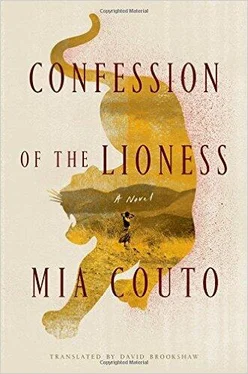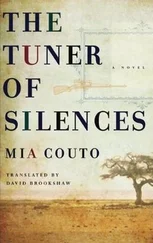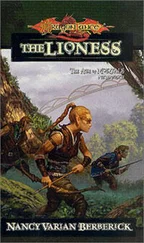Hey, there, Adjiru! You’re a hell of an imposter!
It was like a stone thrown into a puddle without any water. Adjiru’s astonished look was like a wound ready to be opened. Raising his finger, he declared rancorously:
You, Genito, have just snapped the fork when it’s still in the mouth.
Shattered, my grandfather withdrew from the shitala and melted into the night. Only I went with him. I sat down in the dark and waited for him to speak. Finally, after a long pause full of sighs, he complained:
Why? Why did Genito do this to me?
My father’s drunk.
Ungrateful. Ungrateful, the lot of them. What they call lies, I call gifts.
His gaze became lost in infinity. A thousand thoughts swept through Adjiru, a thousand memories. Gradually, his anger subsided.
Do you know something, Mariamar? The saddest thing is that Genito may be drunk, but he’s right. All that bragging in my tales: It’s all smoke and no fire.
You shouldn’t trust the hunter, he admitted. Not because the hunter is a liar. But because hunting contains the truth of a dance: bodies in flight from their own reality. This was how Adjiru understood it.
In fact, he explained, a hunter’s career is made up of fiascoes and forgetfulness. No matter how perfect his aim, a man who hunts is a bungler. For one victory, he has to suffer a thousand defeats. That’s why the hunter is an inventor of his own prowess: because he doesn’t believe in himself, because he’s more fearful of his own weakness than he is of his most ferocious prey.
I’d rather be a liar. For, at heart, I’m nothing. I’ve never done anything.
Don’t say that, Grandfather. You’ve done so much hunting.
Do you want to know something, dear granddaughter? In hunting, the prey works harder than the predator.
He wasn’t complaining. Deep down, his ambition was to be free of all obligations. Happiness, he used to say, consists in not doing anything: To be happy is merely to let God happen. And he fell silent, his hands nervously rubbing his knees.
Suddenly he jumped to his feet, decisive, as if visited by some new spirit. And with firm step, he set off again for the assembly hall. Climbing up on a chair, he puffed out his chest and faced the crowd.
Do you want stories? Well, I’m going to tell you a story. Your story.
Here we go again , some mumbled.
Have you forgotten you were once slaves? Adjiru continued.
We’re doomed , others commented.
Or have you forgotten that we were once taken across the ocean? None of us came back. Or have you forgotten about my father, Muarimi Kapitamoro? He was taken to São Tomé, remember?
We’re going , the men shouted in chorus. And, turning to me, they added: Come with us, because the words are going to fall thick and fast now.
One by one they walked off, until I was the only one left in the hall, my heart in my hands, as I stared at the wobbly chair on top of which my grandfather continued his impassioned rhetoric. I even dared, with timid voice, to call him back into the world. But at that moment, I was invisible to him. An enraged prophet had taken possession of my old relative.
Do you know why the slaves left no memory? Because they have no grave. One of these days, here in Kulumani, no one will have a grave anymore. And there will no longer be any memory that there were once people here …
Grandfather, let’s go home.
Nowadays, we don’t even have to be put on ships. São Tomé is right here, in Kulumani. Here, we all live together, the slaves and the slave owners, the poor and the owners of the poor.
* * *
At that moment, in the now-empty hall, I watched my grandfather Adjiru as if he were a little boy, more solitary and vulnerable than I was. I walked over to the chair that was his stage, and reached up to touch his hand.
Come, Granddad. Let’s go home.
Arm in arm, we walked along the path next to the river.
The Hunter’s Diary: THREE. A Long, Unfinished Letter
A man sees the mist; a woman sees the rain.
— A PROVERB FROM KULUMANI
That same night, availing ourselves of the most lavish hospitality they could provide, we are installed in the administration building. It is suggested that we shift the piles of folders belonging to the archive to one side, and that we use one or two threadbare sofas that were rotting away there. That way, we would have some improvised tables and beds.
Exuding bonhomie, the administrator bids us good night as he leaves, and, smiling broadly, says:
Tomorrow a lady from the village will come to do the cleaning and prepare a meal.
It was supposed to be Tandi, our maid , the First Lady corrects him. But it so happens that she—
She’s indisposed , Florindo cuts in hurriedly.
Indisposed? What do you mean by that, husband? Indisposed?
Makwala pushes his wife gently but firmly out into the front yard. They go on arguing outside. Gradually the sound of their voices fades. They seem to have moved away, but the sound of Naftalinda’s nervous footsteps indicates that she is coming back, determined to leave us with the last word:
This is just to clarify things: Indisposed means assaulted, almost killed. And it wasn’t the lions that did it. The biggest threat in Kulumani doesn’t come from the beasts of the bush. Take care, my friends, take great care.
The woman leaves once more and I think what a miracle it is that there are doors for such girth. I pass my finger along the top of the desk and smile: It’s among the dust of time and piles of dead letters that I’m going to write this diary. This manuscript is no more than a long, unfinished letter to Luzilia.
* * *
I awaken the writer with unnecessary energy. The man had fallen asleep a short time ago, and he must now be emerging from a deep well.
I need your help. Follow me in the car and with the headlamps on so that I can see in front of me …
What’s happening?
These guys have filled the paths with traps.
So what?
I’m a hunter, I don’t use traps.
I go ahead on foot, while the sleepy writer drives the vehicle slowly behind me. Here and there I pick up traps, which I chuck in the back of the jeep. Farther on I come face-to-face with a structure made of trunks the height of a man, on top of which there’s a thatch roof.
It looks like a house , the writer warns.
It’s an utegu , a trap for catching lions.
I throw a rope around the trunks and tie it to the jeep, ordering Gustavo to reverse and drag the roof and palisade away.
Go on, harder, put your foot down!
The straining of the engine, along with my impatient cries, makes me recall my childhood. I remember one time when my father decided I would go with him into the bush. My dear mother opposed this vigorously: Apart from the dangers of hunting, we were in the middle of a war. They argued at the front door to our house, it was early morning and my mother’s yells attracted the attention of our neighbors. Old Bullseye decided to put an end to the dispute: He bundled me into the jeep and locked himself in with me. The vehicle reversed in such crazy haste that I was suddenly hurled violently against the windshield, which shattered. The blood flowed hotly down my face. I remember how my mother carried me away, weeping silently. As she lay me on my bed, my blood staining her arms, she declared, mysterious and serene:
Let us be clear about this, husband: This child will never be a hunter.
Читать дальше












